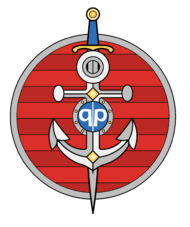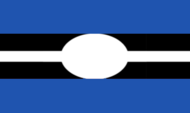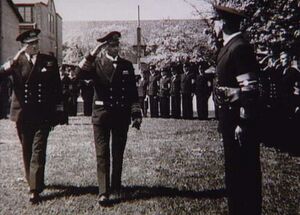Posukosoti: Difference between revisions
m (Flatstone moved page Szŧōnɉōnzī to Posukoşoti) |
No edit summary |
||
| (38 intermediate revisions by the same user not shown) | |||
| Line 1: | Line 1: | ||
{{Infobox national military | {{Infobox national military | ||
| name = | | name = Posukoşoti | ||
| native_name = | | native_name = Stone Pirates | ||
| image = | | image = [[File:Posukoşoti Coat of Arms.png|link=|190px]] | ||
| alt = | | alt = Posukoşoti coat of arms | ||
| caption = | | caption = Posukoşoti coat of arms | ||
| image2 = | | image2 = [[File:Posukosoti2.png|link=|190px]] | ||
| alt2 = | | alt2 = Visual representation of a Posukoşoti arm band | ||
| caption2 = | | caption2 = Visual representation of a Posukoşoti arm band | ||
| motto = " | | motto = "Dāg Ekuş Egā!"<small>(Northern Ivili)</small><br>"Life Above Water!"<small>(English)</small> | ||
| founded = 1214-1903 (Mercenary)<br>1903-Present (Paramilitary) | | founded = 1214-1903 (Mercenary)<br>1903-Present (Paramilitary) | ||
| current_form = Paramilitary Organization | | current_form = Paramilitary Organization | ||
| branches = | | branches = Poşotī Regiment <br> Umokosu Regiment <br> Collaberators Division | ||
| headquarters = | | headquarters = Kumonlān (Umokosu Regiment)<br>Umudīn (Poşotī Regiment) | ||
| flying_hours = | | flying_hours = | ||
| website = <!--{{URL|example.mil}}--> | | website = <!--{{URL|example.mil}}--> | ||
<!-- Leadership --> | <!-- Leadership --> | ||
| commander-in-chief = | | commander-in-chief = [[Albejt Loskena]] | ||
| commander-in-chief_title = Captain | | commander-in-chief_title = Captain | ||
| chief minister = | | chief minister = | ||
| Line 22: | Line 22: | ||
| minister = | | minister = | ||
| minister_title = | | minister_title = | ||
| commander = | | commander = Ajten Da | ||
| commander_title = First Mate | | commander_title = First Mate | ||
<!-- Manpower --> | <!-- Manpower --> | ||
| Line 51: | Line 51: | ||
| ranks = | | ranks = | ||
}} | }} | ||
The '''Stone Pirate's''' or ''' | The '''Stone Pirate's''' or '''PK''' ([[Northern Ivili Language|Northern Ivili]]: ''Posukoşoti'') is a paramilitary non-profit organization supported by the State. It serves to act as a military organization independent of the Stonish Army, occasionally being known to participate in various recreational activities such as {{wp|Shooting Sports}} or {{wp|Weapons Training}} in [[Flatstone]]. | ||
== Foundation == | == Foundation == | ||
The | The Posukoşoti were created by Stonish King [[Andesen of Flatstone|Andesen Von Stone]] in 1214 during the [[First Stonish War of Unification]] in order to fulfill his need for a primarily {{wp|Marines|naval-based ground force}} capable of conducting extensive military operations throughout the [[Şotīko]] archipelago. The organization saw huge amounts of success initially, most notably during their collaboration with Stonish Noble Gejt Kok in his defense of northern-occupied Southern-Ivili territory, and under the command of Andesen Von Stone during his victory in Suntugā Bay. | ||
== Activity during [[Stonish Invasion of Hoterallia]] == | == Activity during [[Stonish Invasion of Hoterallia]] == | ||
The | The Posukoşoti saw limited action during Flatstone's first invasion of Hoterallia, participating in over a dozen minor military operations off of the Hoterallian coast, most notably of which was the first Stonish landings in Hoterallia. In cooperation with Andesen I's forces, two islands off the coast of Hoterallia were successfully occupied in order to be utilized as staging points for an invasion of the mainland in the future. From this point on, the Posukoşoti would remain restricted to naval operations off the coast, at no point participating in either of the Stonish landings in Saipoi or Ryuiki. The Posukoşoti would suffer it's first military loss since it's creation during the Second Battle of the Sunadic against Hoterallia when the Stonish battlefleet was obliterated during it's attempt to withdrawal to [[Sotigabon|Şotīgābon]]. | ||
== Transformation into a Paramilitary Organization == | == Transformation into a Paramilitary Organization == | ||
[[File:Stonish-Navy-Officers-Saluting-Szŧōnɉōnzī.jpeg|thumb|left|300px|Stonish Naval Officers saluting members of the | [[File:Stonish-Navy-Officers-Saluting-Szŧōnɉōnzī.jpeg|thumb|left|300px|Stonish Naval Officers saluting members of the Posukoşoti during a join naval exercise.]] | ||
For the entirety of it's existence up until the 20th century, the | For the entirety of it's existence up until the 20th century, the Posukoşoti had acted as a mercenary company politically tied to the Stonish Crown, however when the King of Flatstone outlawed mercenary companies, the Posukoşoti were forced to adapt, adopting the status of paramilitary organization in correspondence with the nations laws as well as taking the time to modernize the organizations policies resulting in the creation of the '''Collaborators Division''', a branch of the organization comprised of volunteers from the working class, primarily railroad workers and others who worked in industrial environments. Alongside this, the organization would be divided into two main "Regiments", both of which having their own individual bases, operations, and leadership. These new regiments being the Posukoşoti Regiment and the Umokosu Regiment. These two regiments were much more strict on recruitment qualifications, only accepting veterans who had served in the Stonish Armed Forces prior to their entry into the organization; This included individuals who had been dishonorably discharged. | ||
== Being Declared a Terrorist Organization == | |||
In 1966, following shortly after the [[White Revolution]] and the rise to power of democracy in Flatstone, the Posukosoti declared its allegiance to the now in-exile Stonish crown. In retaliation, the democratic government declared the paramilitary a terrorist organization and demanded for its dismemberment. The Posukosoti would refuse to disband itself, instead fleeing from democratic Stonish authorities and resorting to operating underground, however while the organization continued to exist, the majority of its members resigned from their positions within it in an act of cooperation with the new democratic government. Until the [[Stonish Civil War]] in 1991, the remnants of the Posukosoti would conduct a number of coordinated attacks on the democratic government in an effort to hinder their control over the nation; these attacks would particularly increase in severity in the years leading up to the Stonish Civil War in 1991. These various attacks on the democratic state would further solidify the organizations status as a terrorist organization up until 1993 during the Stonish civil war when it reemerged from its exiled status to fight alongside the Stonish loyalists of the time during the civil war. | |||
[[File:Szŧōnɉōnzī Racing Stripe.png|thumb|right|300px|Posukoşoti racing stripe.]] | |||
== Service during the [[Stonish Civil War]] == | == Service during the [[Stonish Civil War]] == | ||
The | The Posukoşoti would partake in the 2011 Stonish Civil War on the side of the Stonish Crown, participating in the Umokosu Offensive against Republican Forces, however political unrest prior to the outbreak of the war lead to lackluster recruitment efforts and the Posukoşoti were unable to maintain their status as an organized paramilitary throughout the duration of the war, only managing to recollect their assets in the years following its conclusion. | ||
== Modern Day == | == Modern Day == | ||
Today, the | Today, the Posukoşoti have maintained their political ties to the Stonish Crown, reasserting themselves as a paramilitary organization. As of 2020, their numbers have reached higher then ever, with 7,000 members actively participating in the organization. This number dwarfs the original 700 or so men that originally volunteered for service in the Posukoşoti during the [[First Stonish War of Unification]]. High-Ranking officials within the Posukoşoti have participated in a variety of talk-shows throughout Flatstone, even appearing on national television in an interview with king [[Dag Von Stone]] himself in July of 2019. | ||
[[Category:Flatstone]] | |||
Latest revision as of 17:53, 1 February 2023
| Posukoşoti | |
|---|---|
| Stone Pirates | |
 Posukoşoti coat of arms | |
 Visual representation of a Posukoşoti arm band | |
| Motto | "Dāg Ekuş Egā!"(Northern Ivili) "Life Above Water!"(English) |
| Founded | 1214-1903 (Mercenary) 1903-Present (Paramilitary) |
| Current form | Paramilitary Organization |
| Service branches | Poşotī Regiment Umokosu Regiment Collaberators Division |
| Headquarters | Kumonlān (Umokosu Regiment) Umudīn (Poşotī Regiment) |
| Leadership | |
| Captain | Albejt Loskena |
| First Mate | Ajten Da |
| Personnel | |
| Military age | 16 |
| Conscription | No |
| Active personnel | 7,000+ |
The Stone Pirate's or PK (Northern Ivili: Posukoşoti) is a paramilitary non-profit organization supported by the State. It serves to act as a military organization independent of the Stonish Army, occasionally being known to participate in various recreational activities such as Shooting Sports or Weapons Training in Flatstone.
Foundation
The Posukoşoti were created by Stonish King Andesen Von Stone in 1214 during the First Stonish War of Unification in order to fulfill his need for a primarily naval-based ground force capable of conducting extensive military operations throughout the Şotīko archipelago. The organization saw huge amounts of success initially, most notably during their collaboration with Stonish Noble Gejt Kok in his defense of northern-occupied Southern-Ivili territory, and under the command of Andesen Von Stone during his victory in Suntugā Bay.
Activity during Stonish Invasion of Hoterallia
The Posukoşoti saw limited action during Flatstone's first invasion of Hoterallia, participating in over a dozen minor military operations off of the Hoterallian coast, most notably of which was the first Stonish landings in Hoterallia. In cooperation with Andesen I's forces, two islands off the coast of Hoterallia were successfully occupied in order to be utilized as staging points for an invasion of the mainland in the future. From this point on, the Posukoşoti would remain restricted to naval operations off the coast, at no point participating in either of the Stonish landings in Saipoi or Ryuiki. The Posukoşoti would suffer it's first military loss since it's creation during the Second Battle of the Sunadic against Hoterallia when the Stonish battlefleet was obliterated during it's attempt to withdrawal to Şotīgābon.
Transformation into a Paramilitary Organization
For the entirety of it's existence up until the 20th century, the Posukoşoti had acted as a mercenary company politically tied to the Stonish Crown, however when the King of Flatstone outlawed mercenary companies, the Posukoşoti were forced to adapt, adopting the status of paramilitary organization in correspondence with the nations laws as well as taking the time to modernize the organizations policies resulting in the creation of the Collaborators Division, a branch of the organization comprised of volunteers from the working class, primarily railroad workers and others who worked in industrial environments. Alongside this, the organization would be divided into two main "Regiments", both of which having their own individual bases, operations, and leadership. These new regiments being the Posukoşoti Regiment and the Umokosu Regiment. These two regiments were much more strict on recruitment qualifications, only accepting veterans who had served in the Stonish Armed Forces prior to their entry into the organization; This included individuals who had been dishonorably discharged.
Being Declared a Terrorist Organization
In 1966, following shortly after the White Revolution and the rise to power of democracy in Flatstone, the Posukosoti declared its allegiance to the now in-exile Stonish crown. In retaliation, the democratic government declared the paramilitary a terrorist organization and demanded for its dismemberment. The Posukosoti would refuse to disband itself, instead fleeing from democratic Stonish authorities and resorting to operating underground, however while the organization continued to exist, the majority of its members resigned from their positions within it in an act of cooperation with the new democratic government. Until the Stonish Civil War in 1991, the remnants of the Posukosoti would conduct a number of coordinated attacks on the democratic government in an effort to hinder their control over the nation; these attacks would particularly increase in severity in the years leading up to the Stonish Civil War in 1991. These various attacks on the democratic state would further solidify the organizations status as a terrorist organization up until 1993 during the Stonish civil war when it reemerged from its exiled status to fight alongside the Stonish loyalists of the time during the civil war.
Service during the Stonish Civil War
The Posukoşoti would partake in the 2011 Stonish Civil War on the side of the Stonish Crown, participating in the Umokosu Offensive against Republican Forces, however political unrest prior to the outbreak of the war lead to lackluster recruitment efforts and the Posukoşoti were unable to maintain their status as an organized paramilitary throughout the duration of the war, only managing to recollect their assets in the years following its conclusion.
Modern Day
Today, the Posukoşoti have maintained their political ties to the Stonish Crown, reasserting themselves as a paramilitary organization. As of 2020, their numbers have reached higher then ever, with 7,000 members actively participating in the organization. This number dwarfs the original 700 or so men that originally volunteered for service in the Posukoşoti during the First Stonish War of Unification. High-Ranking officials within the Posukoşoti have participated in a variety of talk-shows throughout Flatstone, even appearing on national television in an interview with king Dag Von Stone himself in July of 2019.

